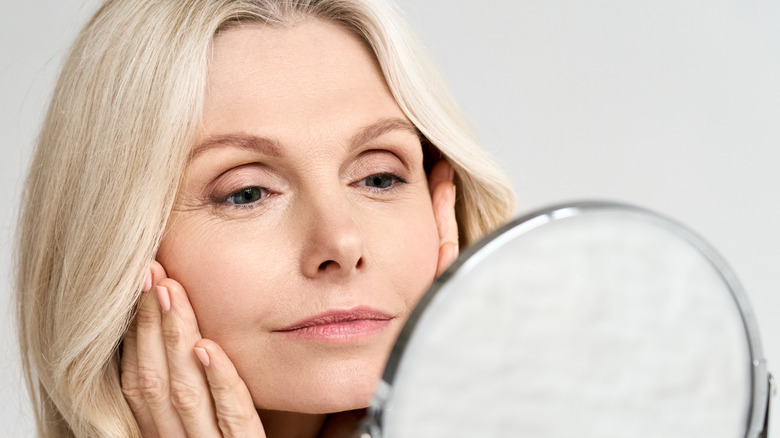How Much Collagen You Really Lose Each Year
Anne Hathaway walked onto the red carpet at the Cannes Film Festival last week and united the internet for a brief moment. They all agreed: "Anne Hathaway arriving at Cannes Film Festival looking gorgeous and exactly the same as the Princess Mia 21 years ago" (via Twitter). Another user tweeted, "notice how unproblematic people don't age. Anne Hathaway and Gemma Chan are both 39."
While being unproblematic definitely helps with reduced visible signs of aging (as does being 39), there are many other factors that affect the way you age: Sun exposure, smoking, alcohol consumption, and diet are only a few (per the Annals of Plastic Surgery, posted at the National Library of Medicine). The physical changes your body goes through range from shrinking bones and weakened muscles to reduced skin elasticity (via Mayo Clinic), and this usually becomes noticeable around the mid- to late-20s. This is because collagen, a protein that's responsible for healthy joints and skin elasticity, begins to deplete around that time (via Huffpost).
The rate depends on many factors
Collagen is a structural protein that we naturally produce, and it can be found in connective tissue, skin, tendons, bones, and cartilage (via Healthline). "Think of it as the glue that holds everything in the body together," registered dietitian Tony Castillo told Forbes. However, production begins to slow down as you age, resulting in lower skin elasticity and visible signs of aging like wrinkles.
There are many factors that can affect how quickly you're losing collagen, and it's all connected to your lifestyle and genetics. Researchers have even proposed a "pace of aging" score to understand the overall phenomenon of aging in individuals (via Neuroscience News). However, researchers also specifically studied the rate of collagen production.
Researchers found that most people begin to lose about 1% of their collagen every year (via British Journal of Dermatology)."This contributes to sagging and the appearance of wrinkles and fine lines," dermatologist Shari Marchbein explained to Forbes. It's also important to note that the rate of collagen depletion can vary based on your lifestyle and how much you're exposing yourself to UV rays. So, there are many factors in your control when it comes to collagen production.
Collagen supplement can help
According to one study, collagen was significantly lowered after exposure to UV light (via National Library of Medicine). "The sun is the ultimate ager, it accelerates the breakdown of collagen fibers leading to the formation of wrinkles," Dr. Shari Marchbein, a dermatologist, explained to Forbes. Pairing a hat with SPF 30 regularly can help with collagen depletion.
To boost collagen production, pile your plate high with foods rich in vitamin C; broccoli, citrus fruits, and peppers should be mainstays in your grocery shopping list. You should also add eggs, beef, and other protein-rich foods to the cart, as they are rich in nutrients that can help with collagen synthesis (via WebMD). Taking collagen supplements are also a quick and easy solution; they come as powders, liquids, and capsules that you can add to smoothies or your morning coffee. Long-term effects of taking supplements include improved skin elasticity, increased hydration, and smoothened fine lines (via Mind Body Green).


